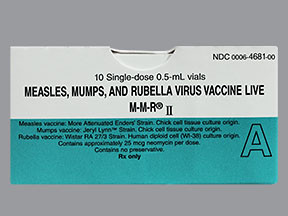MEASLES/MUMPS/RUBELLA VACCINE - INJECTION
PHONETIC PRONUNCIATION: (MEE-zulz/mumps/ roo-BEL-a)
COMMON BRAND NAME(S): MMR II
GENERIC NAME(S): measles, mumps, and rubella vaccine live/PF
Uses
USES: This vaccine is used to help prevent serious, sometimes fatal, infections caused by 3 viruses: measles (also known as rubeola), mumps, and rubella (also known as German measles). These are common childhood infections that may cause severe problems (such as deafness, lung/brain problems, or harm to an unborn baby). Therefore, preventing these infections through vaccination is very important. This vaccine contains live viruses that have been weakened. It works by causing the body to produce its own protection (antibodies) against the viruses that cause measles, mumps, and rubella.
How to use MEASLES/MUMPS/RUBELLA VACCINE - INJECTION
HOW TO USE: Read all vaccine information available from your health care professional before receiving the vaccine. If you have any questions, ask your health care professional. This vaccine is usually given by injection under the skin by a health care professional. In Canada, certain brands can also be given by injection into a muscle. Adults usually get 1 dose of the vaccine and children usually get 2 doses of the vaccine. Ask your health care professional about the vaccination schedule.
Side Effects
Precautions
Interactions
Overdose
Images
Reviews
Faq for MEASLES/MUMPS/RUBELLA VACCINE - INJECTION
The MMR vaccine is a vaccination given to protect against three potentially serious viral infections: measles, mumps, and rubella.
The MMR vaccine is typically administered via an injection in the upper arm or thigh.
It is important to get the MMR vaccine to protect yourself and others from the potentially severe complications of measles, mumps, and rubella. Vaccination also plays a crucial role in preventing outbreaks of these diseases.
Some common side effects of the MMR vaccine include mild fever, rash, and soreness or redness at the injection site. Serious side effects are rare.
The standard schedule for MMR vaccine doses is two doses: the first dose is recommended at 12-15 months of age, and the second dose is recommended at 4-6 years of age.
Yes, adults who have not been vaccinated or who haven't had measles, mumps, or rubella in the past can receive the MMR vaccine.
The MMR vaccine is generally not recommended during pregnancy due to theoretical risks to the fetus. However, if a woman becomes pregnant shortly after receiving the vaccine, there is no evidence of increased risks.
The MMR vaccine provides long-lasting immunity for most individuals. However, a small percentage of vaccine recipients may lose immunity over time, and therefore, it is recommended to receive the necessary booster doses.
Numerous scientific studies have found no evidence of a link between the MMR vaccine and autism. The claim that vaccines cause autism has been thoroughly debunked.
Disclaimer
IMPORTANT: HOW TO USE THIS INFORMATION: This is a summary and does NOT have all possible information about this product. This information does not assure that this product is safe, effective, or appropriate for you. This information is not individual medical advice and does not substitute for the advice of your health care professional. Always ask your health care professional for complete information about this product and your specific health needs.


No Reviews Yet